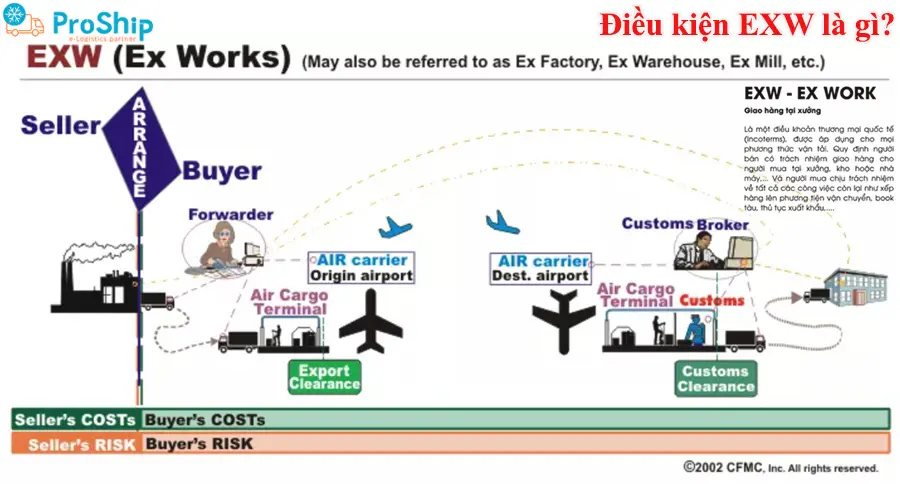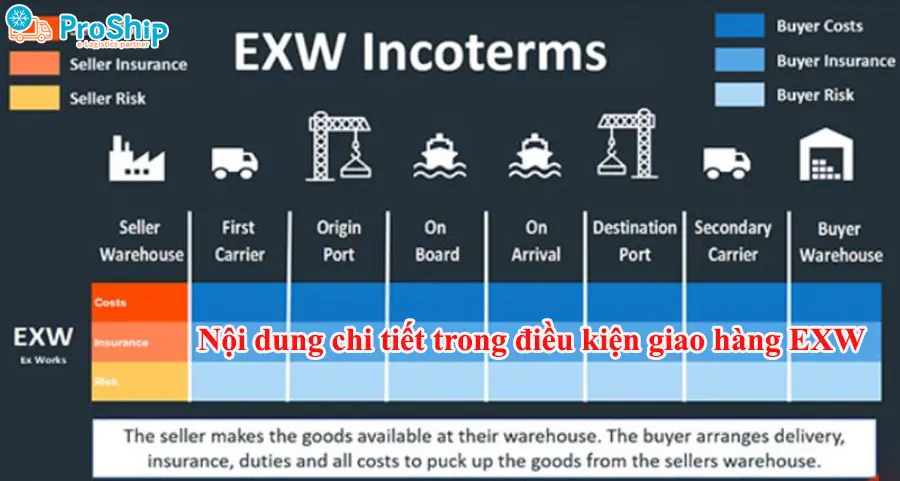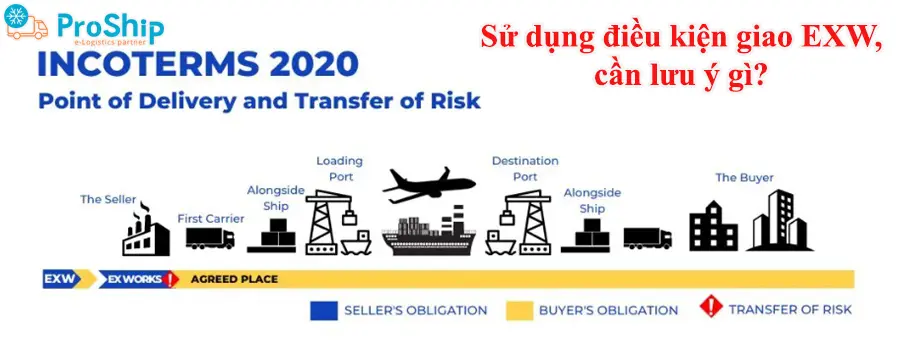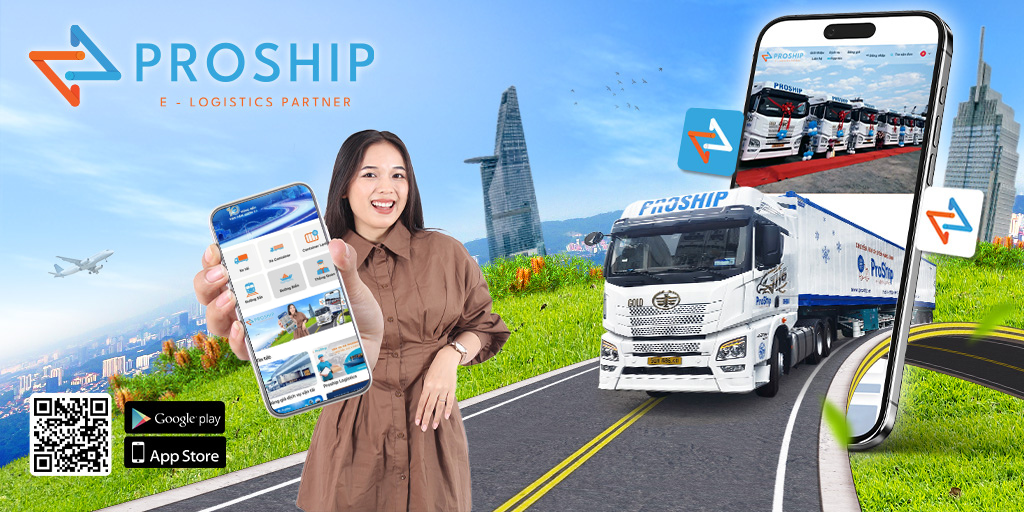x Các tư nhân, doanh nghiệp xuất nhập khẩu hàng hóa cần tìm hiểu rõ hơn về điều kiện EXW?
x Bạn muốn biết nội dung, trách nhiệm của người bán và người mua trong điều kiện EXW Incoterms?
x Doanh nghiệp bạn chưa có kinh nghiệm sử dụng điều kiện EXW có cần lưu ý gì hay không?
Thuật ngữ EXW thường được thấy nhiều trong các giao dịch thương mại xuất nhập khẩu…Proship.vn chúng tôi sẽ giúp bạn làm rõ về điều kiện EXW là gì; nội dung trong điều kiện giao hàng EXW gồm những gì, bên bán bên mua có trách nhiệm gì; sử dụng EXW cần lưu ý những gì ngay sau đây.
Điều kiện EXW là gì?
EXW là gì trong xuất nhập khẩu? Điều kiện EXW là viết tắt của cụm từ Ex Work, tức là Giao hàng tại xưởng hoặc Giá xuất xưởng. Đây là một trong 11 điều khoản trong Incoterm và được sử dụng cho mọi phương thức vận chuyển, gồm đường thủy nội địa, đường hàng không và đường biển.
Điều kiện giao hàng EXW quy định người bán giao hàng cho người mua tại xưởng, kho hoặc nhà máy,…Người mua chịu trách nhiệm về tất cả các công việc còn lại như xếp hàng hóa lên phương tiện vận chuyển, book tàu,…

Trong hợp đồng ngoại thương, điều kiện EXW được dẫn chiếu bằng cách ghi điều khoản đi kèm với địa chỉ giao hàng của người bán (kho xưởng của người xuất khẩu là địa điểm thường được sử dụng nhiều nhất). Sử dụng cấu trúc sau: EXW + Địa điểm giao hàng + Phiên bản Incoterms.
* Ví dụ: Nếu địa điểm giao hàng người bán là KCN Nhơn Trạch 1, Đồng Nai. Trong chứng từ và hợp đồng cần thể hiện rõ: EXW Nhon Trach Industrial Zone – Dong Nai – Vietnam, Incoterms 2010.
Nội dung chi tiết trong điều kiện giao hàng EXW
Trong điều kiện EXW sẽ bao gồm những nội dung, quy định cụ thể sau:
Về phương thức vận tải
Điều kiện giao hàng EXW sẽ được sử dụng cho mọi phương thức vận tải và có thể sử dụng khi có nhiều phương tiện vận tải tham gia, điều kiện EXW incoterms 2010, 2020 phù hợp với thương mại nội địa.
Về nơi giao hay địa điểm giao hàng
Các bên nên quy định càng rõ càng tốt địa điểm giao hàng tại nơi giao hàng chỉ định. Việc này sẽ giúp các bên xác định rõ khi nào và tại đâu thì hàng hóa và rủi ro đối với hàng hóa được chuyển giao từ người bán sang cho người mua, cũng đồng thời là điểm mà từ đó mọi chi phí liên quan đến việc vận chuyển hàng sẽ do người mua chịu.
Nếu hai bên không có thỏa thuận về một địa điểm cụ thể tại nơi giao hàng chỉ định và nếu tại nơi giao hàng chỉ định có nhiều điểm có thể giao hàng, thì người bán có thể chọn một điểm giao hàng phù hợp nhất với mục đích của mình.
Về chuyển giao hàng hóa và rủi ro
Giao hàng tại xưởng đề cập đến việc chuyển giao hàng hóa cho người mua tại một địa điểm do người bán chỉ định, có thể là tại cơ sở của người bán hoặc một địa điểm khác như nhà máy, nhà kho, xưởng,…
Địa điểm này không nhất thiết phải là một cơ sở của người bán. Trong quá trình giao hàng, người bán không có nghĩa vụ xếp hàng lên phương tiện vận tải được chỉ định bởi khách hàng, cũng như không phải thực hiện thủ tục hải quan xuất khẩu.

Về trách nhiệm của người bán, người mua
Trách nhiệm của người bán và người mua theo điều kiện EXW là gì? Quy định của điều kiện EXW trong Incoterms 2020 chỉ rõ trách nhiệm, nghĩa vụ của người bán và người mua như sau:
Trách nhiệm của người bán
- Người bán phải chuẩn bị đầy đủ hàng hóa như hợp đồng và cung cấp các chứng từ liên quan đến hàng hóa và thông báo đúng thời gian, địa điểm giao hàng, đảm bảo giao hàng đúng nơi quy định trong hợp đồng;
- Người bán chịu trách nhiệm các phí tổn thất, phí phát sinh và rủi ro cho đến khi hàng hóa được xếp lên phương tiện vận chuyển của người mua;
- Hỗ trợ người mua về các thủ tục xuất khẩu khi có yêu cầu hoặc trong trường hợp hợp đồng có quy định;
- Không có trách nhiệm bốc hàng và chịu chi phí bốc hàng lên phương tiện vận tải mà người mua chỉ định, trừ khi hợp đồng có quy định khác.
Trách nhiệm của người mua
- Thanh toán đủ tiền hàng và chịu mọi rủi ro, chi phí phát sinh từ khi nhận hàng tại cơ sở của người bán. Bao gồm các chi phí sau: chi phí kiểm hàng, chi phí bốc hàng, chi phí bảo hiểm, chi phí thông quan xuất khẩu và hoàn trả một số chi phí do người bán bỏ ra để hỗ trợ cho mình,…;
- Nhận hàng tại địa điểm và thời gian đã thỏa thuận trong hợp đồng;
- Làm thủ tục thông quan xuất khẩu, quá cảnh và nhập khẩu cho lô hàng. Đồng thời là bên chịu các chi phí liên quan đến những việc trên.
* Tóm lại, EXW là điều khoản Incoterms mà người mua phải chịu trách nhiệm và chi phí tối đa, trong khi đó, người bán chịu trách nhiệm và chi phí tối thiểu.
Sử dụng điều kiện giao hàng EXW, lưu ý gì?
Khi sử dụng điều kiện giao hàng EXW, người mua và người bán cần lưu ý:
- Nếu người mua không thế trực tiếp các thủ tục xuất khẩu hoặc nhờ người khác tức gián tiếp tham gia thì không nên sử dụng các điều kiện này bởi nếu vậy người bán sẽ phải chịu các chi phí và những rủi ro phát sinh;
- Người mua và người bán chỉ việc thực hiện đúng những điều khoản đã ghi trong hợp đồng ngoài ra những cái khác thì sẽ phải bổ sung thêm nếu muốn đổi điều kiện;
- Người bán không có trách nghiệm phải tham gia vào việc bốc, xếp hàng hóa tuy nhiên nếu được yêu cầu thì có thể giúp bằng cách nhận phí hỗ trợ;
- Cần ghi rõ địa điểm giao và các chi phí cùng rủi ro trong quá trình bán hàng và người mua cần phải chi trả tất cả những chi phí liên quan trong quá trình bốc dỡ hàng hóa từ xưởng lên các phương tiện vận tải;

- Người mua là người trực tiếp giao dịch nếu muốn áp dụng điều kiện EXW, nếu không thì những điều kiện về EXW không được thực hiện;
- Người mua hạn chế cung cấp những thông tin về hàng hóa xuất khẩu cho người bán, tuy nhiên người bán cũng cần biết những thông tin để tính thuế và lập các báo cáo bán hàng;
- Cần đưa ra những điều kiện hợp lí trong hợp đồng để có thể thuận mua vừa bán bởi những điều kiện này nếu không bổ sung các điều khoản thì khá là bất lợi cho người mua vả lại rất lợi cho người bán hàng;
- Sau khi hàng rời khỏi xưởng, người bán không phải chịu những rủi ro liên quan tới hàng hóa bởi điều đó đã được chuyển hết sang cho người mua.
Trên đây là những kiến thức cần biết về điều kiện EXW, nội dung của điều kiện EXW là gì, trách nhiệm của bên mua và bên bán được quy định ra sao trong EXW, cần lưu ý gì,…đã được giải đáp nhanh bởi Proship Logistics. Quý doanh nghiệp xuất nhập khẩu có bất cứ thắc mắc nào liên quan tới điều kiện giao hàng EXW, liên hệ ngay 0909 344 247 để được giải đáp và cung cấp các Dịch vụ vận chuyển Đa phương thức giá rẻ.

